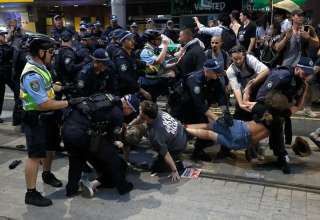This article was first published in The Oriental Despot
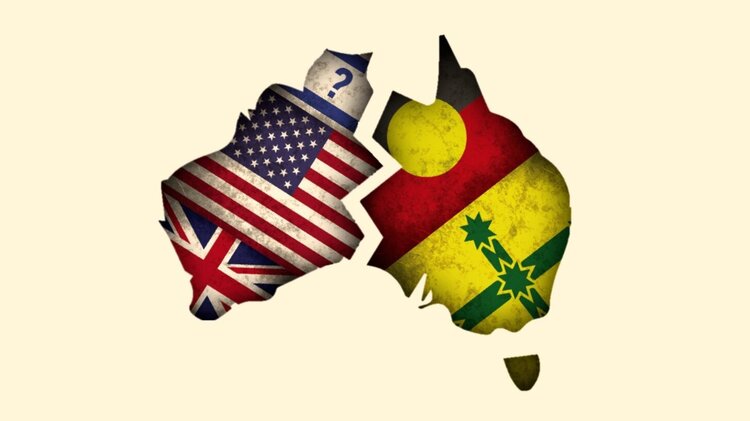
Image: Australia, torn between foreign interference and independent interests. The ‘green & gold’ Eureka is my contribution to the Australian Republican ‘flag debate’.
by Jay Tharappel
This was written in the immediate aftermath of the Friday 26 June ASIO raids conducted against the homes of NSW parliamentarian Shaoquett Moselmane and his staffer John Zhang, which are the first to be carried out under the ‘foreign interference’ laws introduced in June 2018, ostensibly intended to prevent foreign governments from influencing our political affairs in ways detrimental to Australia’s national interest.
The 2018 ‘foreign interference’ legislation
The new legislation includes the Espionage and Foreign Interference Act (EFI), and the subsequent Foreign Influence Transparency Scheme. The EFI introduces forty-five new offences related to treason, sabotage and dealing with information that harms ‘national security’, the definition of which was modified to include, “the country’s political, military or economic relations with another country or other countries”.
The new legislation also obliges people/organisations in Australia to log their activities involving “foreign principals” on a public register – the “Foreign Influence Transparency Scheme Public Register” – if they believe that “foreign principal” is attempting to “influence” Australian politics. However, there are some important exemptions, namely private banks, corporations, trade unions, business associations, non-political charities, and organised religion.
The big problem for citizens is that the implementation of these laws is purely at the discretion if the government of the day, or in the words of Federal MP Andrew Wilkie, “we should never rely on legislation which at the end of the day is at the whim of a minister”, making it the appropriate tool in the hands of government ministers to target their political enemies.
Two years later, amidst the recent ASIO raids, the dominant corporate-media-driven narrative in Australia, emphasises ‘Chinese subversion’, however, it will be argued that this only diverts attention away from the more fundamental historic reality of Australian political history, which is that “we” have always been harmed by ‘foreign interference’ of the kind these laws claim to counter, not from China, but from the United States and Israel.
The fear of Chinese ‘subversion’
On 1 June, Australian PM Scott Morrison announced an extra $270 billion worth of new defence spending. His justification? “The Indo-Pacific is the epicentre of rising strategic competition… as we have seen recently on the disputed border between India and China, in the South China Sea, and in the East China Sea.” When inflicting that kind of fiscal burden on the taxpayer, it would make logical sense to create a climate of fear so that anyone who opposes such spending can be smeared as disloyal to Australia.
This emphasis on exposing Chinese ‘subversion’ makes logical sense if we assume that the political will behind it embodies the interests of the United States. Over the past two decades, Australia has increased its trade with China and decreased its trade with the US. Asia buys 83% of our exports, of which China makes up 35%; whereas the US buys only 3.9%. Similarly, we import 60% from Asia, of which China makes up 24% – the latter figure being more than double our imports from the US, which sits at 10%. Regarding foreign investment, 94.3% comes from states that that are within the US-led alliance, while only 5.7% comes from China, of which, only 2% comes from ‘mainland’ China, the other 3.7% comes from Hong Kong.
As a side-note, I have long suspected that the underlying reason why the Anglo-US alliance to which we belong, agitated in favour of the Hong Kong protesters (i.e. the ‘foreign interference’ we export), was because Beijing saw Hong Kong as a financial leakage – a place where mainland capitalists illegally stashed large sums of money to be exported to the financial networks of the Anglo-US empire.
From a previous article:
Hong Kong introduced the Fugitives Offenders Ordinance amendment bill, which is favoured by Beijing and would “allow case-by-case transfers of people to countries without extradition treaties, including China” but also to Taiwan and Macau. This is to fix “a ‘loophole’ that they claim has allowed the city to become a haven for criminals from the mainland” and that’s because “there is no formal mechanism for the surrender of fugitives to mainland China”. The global background story regarding capital flight is that from 1980 to 2016, the third-world lost nearly $16.3 trillion USD in capital flight, of which the Chinese share represents around 28%, much of it exiting via Hong Kong.
China wants to fix these leakages, thereby forcing their capitalists to stay loyal to their country, which is precisely what Australia should be doing given that 83% of mining industry profits in Australia flow overseas (covered later).
Should we worry about China? We should be worried about the extent to which our economy has deindustrialised relative to theirs, causing the loss of entire industries in manufacturing over the past three decades, making us far more reliant on Chinese goods than they are on our primary commodities. As Australia went into decline, China transformed itself from a poor agrarian nation into an industrial power and technological leader.
The irony of fearing and obsessing over Chinese subversion, however, is that the influence of the United States on Australia has been far more damaging but also far less known. Australia is a gigantic resource-rich continent with a relatively small population, and as a result, we have one of the highest per-capita natural resource endowments on earth, up there with Saudi Arabia, Canada, and Russia.
What happened to the Australian PM Gough Whitlam when he attempted to nationalise those resources so the profits could be transformed into a sovereign wealth fund to benefit all Australians? He was dismissed by Australia’s unelected ‘head of state’, the Governor-General ‘Sir’ John Kerr, who we now know was acting as an agent of ‘foreign interference’ for the United States, specifically for the Central Intelligence Agency, an episode of Australian history entertainingly explained by the only decent popular source of news in Australia these days, Friendlyjordies.
http://www.youtube.com/watch?v=4Dpx4o_uaGg
US-Israeli involvement in the Gillard ‘coup’ against Rudd
Killing the Mining Tax
In my lifetime, the most underreported example of detrimental ‘foreign interference’ is the leadership spill that ousted former Prime Minister Kevin Rudd on 23 June 2010, who two years ago, published a book about that episode, which received nowhere near the media coverage it deserves. According to the former PM, there are “three sources of major political power” in Australia: 1) the parliament, 2) the Murdoch media, and 3) the mining industry.
When Rudd became PM in December 2007, he attempted to introduce ‘the mining tax’, that is, the ‘Resource Super Profits Tax’ (RSPT), only to face hostility from all three of those sources of power, including his own cabinet, which turned against him under circumstances that should be investigated if we really cared about ‘foreign interference’, especially given that the damage done to the nation can be quantified in monetary terms.
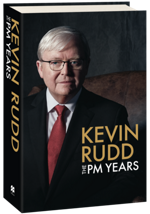 According to his book, ‘Kevin Rudd, The PM Years’, “the original super profits tax would have earned the Commonwealth an estimated $99 billion over a decade”, but after being ousted by his own cabinet in June 2010, the new PM Julia Gillard renegotiated the tax in favour of mining corporations, so that the Australian people “would earn only $38.5 billion”, that is, “Gillard and Swan had yielded more than $60 billion to the miners”, but “in the end, the tax would collect the princely sum of only $404 million!”
According to his book, ‘Kevin Rudd, The PM Years’, “the original super profits tax would have earned the Commonwealth an estimated $99 billion over a decade”, but after being ousted by his own cabinet in June 2010, the new PM Julia Gillard renegotiated the tax in favour of mining corporations, so that the Australian people “would earn only $38.5 billion”, that is, “Gillard and Swan had yielded more than $60 billion to the miners”, but “in the end, the tax would collect the princely sum of only $404 million!”
The Australian people lost $98.5 billion is revenues that could have been invested in education, healthcare, and infrastructure, as a consequence of what Rudd called the “wholesale capitulation to BHP, Rio Tinto, Xstrata and the Minerals Council of Australia” by the Gillard government.
About the mining industry, Rudd argues, “because its corporate majors are usually foreign-dominated, they believe they owe only a fleeting allegiance to Australia, let alone the nation’s democratically elected government”. Indeed according to an article published last year by Dr. Clinton Fernandes, of the twenty largest companies in Australia, fifteen were majority US owned. Luckily for them, as corporations, they are exempted from being obliged to register their dealings involving ‘foreign principals’ under the 2018 laws.
When it comes to the mining industry specifically, the rate of foreign ownership is 83% according to a 2011 study by David Richardson and Richard Denniss for The Australia Institute, which predicted: “Over the next ten years pre-tax profits for mining will likely be around $600 billion; at present levels of foreign ownership around $500 billion of these profits will end up in the hands of foreign owners.” Therefore, what Rudd identifies as the third source of power in Australian politics is also a source of ‘foreign interference’, one that was powerful enough to play some role in toppling him.
When Whitlam wanted to nationalise the mines in 1972, they were worth $5.7 trillion, which, when adjusted for inflation would be worth roughly $59.7 trillion dollars today. According to Ross Gittins, “our mining industry is about 80 per cent foreign-owned – mainly by BHP Billiton, Rio Tinto and Glencore”. The political economy of Sinophobia makes more sense when considering the US began incurring current account deficits from 1976 onwards, largely as a consequence of competition from China.
In this context, we should ask, why is it that the majority US-owned media is so keen on Australians hating the Chinese political system? In China, the commanding heights of the economy are controlled by the government, most importantly the banks, allowing the conscious will of the Communist party to channel investment into productive investment across diverse industries.
It is almost as if our media does not want Australians to ever think we can do the same. In China, the mining industry is dominated by the state, and for commodities like rare earth minerals, mines run at a loss to ensure maximal advantage to firms that need them as inputs, i.e. smartphone manufacturers like Huawei.
Rather than getting angry at China, which achieves nothing for us, why not adopt some of their economic principles? The answer is because every time we tried, ‘foreign interference’ from the United States stopped us. As a result, we have the export composition resembling that of formerly colonised nations – around, 84.8% of our exports in 2018 were comprised of primary commodities[1]. We have among the best living standards in the world solely because we are a small population commanding a very large natural resource endowment, the majority of the revenue from which simply ‘leaks’ overseas as a long-term consequence of ‘foreign interference’ throughout history.
Wikileaks Cable ‘Predicts’ Julia Gillard Becoming PM
Thanks to the work of Julian Assange – our fellow Australian who successive governments have abandoned to the fate of Britain and possibly the United States if he’s extradited – we know that eighteen months into Rudd’s tenure as PM (and twelve months before his ouster), the “US Deputy Chief of Mission in Canberra to Washington”, referring to Daniel A. Clune, had sent a diplomatic cable back to his superiors in the US government titled “Gillard: On Track to Become Australia’s Next Prime Minister”.
Quoting directly from the June 2009 cable, according to Clune, “Gillard recognizes that to become Prime Minister, she must move to the Center, and show her support for the Alliance with the United States”. The leaked cable also suggested that Julia Gillard can be trusted because she had “thrown off the baggage of being from what one analyst called the ‘notoriously anti-Israel faction’ of the ALP”, which the author, the US official Clune, substantiates to his superiors in the US government, by pointing out that during the 2008 Israel-Palestine war, Gillard, by blaming Hamas in her “Gaza statement” (from the cable) for the outbreak of the war, had taken “a stance welcomed by Israel’s supporters in Australia”.
Adding to his list of reasons for why Gillard would be suitable as PM, Clune cites the favourable opinion of 1) Federal Labor MP Michael Danby, who “told us that after the Gaza statement he had a new appreciation of Gillard’s leadership within the ALP”; and 2) the “Israeli Ambassador Yuval Rotem” who told Clune that “Gillard has gone out of her way to build a relationship with Israel and that she asked him to arrange an early opportunity to visit”.
This leads Clune to the conclude that that Gillard was “a strong supporter of the Australia-US Alliance and Israel”, and having read these cables, according to Rudd, “clearly [Gillard] had judged that having the Australian Jewish community on side was as important as having the Americans on side” (emphasis added). How would this have looked had Clune been a Chinese foreign agent rather than a US one, building a coalition behind the back of a sitting PM for a change in leadership?
Rudd on the role of the Israel lobby in the ‘coup’
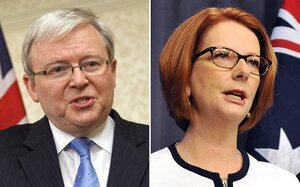 Supported by the leaked diplomatic cable, Rudd suggests an Israeli hand in the palace ‘coup’ against him, because despite self-identifying in his book as, “a lifelong supporter of the state of Israel”, ultimately his “support” for the apartheid regime did not go far enough. The hostility towards Rudd, both from Israel and its Australian lobbyists, seems to begin in February 2010, when news began to emerge suggesting that the Israeli Mossad had, then allegedly, used four forged Australian passports belonging to dual Australian-Israeli citizens, to assassinate a Palestinian member of Hamas, Mahmoud al-Mabhouh, who had travelled to Dubai from Syria.
Supported by the leaked diplomatic cable, Rudd suggests an Israeli hand in the palace ‘coup’ against him, because despite self-identifying in his book as, “a lifelong supporter of the state of Israel”, ultimately his “support” for the apartheid regime did not go far enough. The hostility towards Rudd, both from Israel and its Australian lobbyists, seems to begin in February 2010, when news began to emerge suggesting that the Israeli Mossad had, then allegedly, used four forged Australian passports belonging to dual Australian-Israeli citizens, to assassinate a Palestinian member of Hamas, Mahmoud al-Mabhouh, who had travelled to Dubai from Syria.
According to Rudd, when it was decided in a cabinet meeting that the Israeli diplomat should be expelled, “everyone was nodding in agreement – except Julia” (emphasis added). After the decision to expel the Mossad agent was publicised in May 2010, Rudd was lobbied by the Israeli ambassador, Yuval Rotem, and received “complaints from the Australian Jewish lobby” including from Colin Rubenstein and Mark Leibler, both now on the executive board of the Australia/Israel Jewish Affairs Council (AIJAC).
Twenty days before the ‘coup’ against him, Rudd met with Leibler for dinner. According to Rudd, “Mark Leibler berated me for having committed such a hostile act”, and thus opined, that “for Leibler to attack the democratically elected prime minister of his country as he sought to argue the interests of another country was beyond the pale”.
Rudd then revealed to Leibler facts kept from the Australian public until the release of his book, which is that such criminal misuse of Australian passports had also occurred in 2003, however, it was kept secret from the public by the Howard government. Rudd to Leibler; “they did exactly the same under Howard, got a gentle rap over the knuckles, and promised never to do it again”, indeed earlier in the book, Rudd noted that Israel was “forced to sign an agreement with us that if we were to continue intelligence cooperation with them in the future, they would never do this again”.
What followed according to Rudd should be read in full:
“Leibler looked stunned. ‘I don’t believe you.’ ‘Then why don’t you sit down with the head of Foreign Affairs, who is the former head of ASIO, and I’ll authorise him to brief you on exactly what has happened here,’ I countered. ‘I think you’ll find that our response to Israel’s actions has been entirely reasonable under the circumstances.’ Leibler still stared at me in disbelief. And then disbelief turned to anger. Apropos of nothing, he said, ‘Julia is looking very good in the public eye these days, Prime Minister. She’s performing very strongly. She’s a great friend of Israel. But you shouldn’t be anxious about her, should you, Prime Minister?’ It was Leibler at his menacing worst.” (emphasis added)
For the record, Leibler has since confirmed that the dinnertime discussion with Rudd happened, but denied Rudd’s account, claiming it is “completely false, virtually from top to bottom”, calling it “far-fetched conspiracy theories”. But the exchange as narrated by Rudd opens up some interesting questions: John Howard didn’t tell us that.
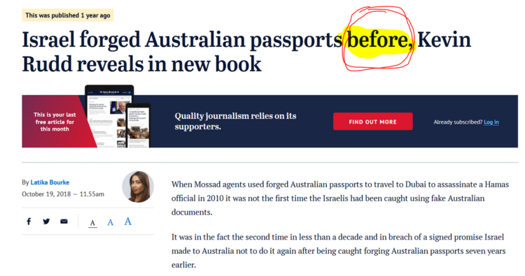
If Leibler genuinely did not believe Rudd when it was revealed to him that this was Israel’s second offence, why was he not willing to accept Rudd’s offer of a briefing from the former head of ASIO? Did he have prior knowledge of the first offence? Did he have prior knowledge about Gillard’s out-of-nowhere ‘coup’ against Rudd? Did he act on his alleged preference for Gillard over Rudd by playing any role in the eventual ‘coup’? If we are worried about ‘foreign interference’, why not investigate these questions?
The misuse of passports by one state against another is considered a violation of sovereignty, but that did not stop some of our politicians from publicly endorsing this violation of our laws, even when they jeopardize the safety of Australians travelling abroad. For example, at the time of the scandal, despite one of the owners of a forged passport, Adam Korman, ostensibly claiming to have been the victim of “identity theft” in a report published on 26 February 2010, around the same time (if not after), Senator Julian McGauran defended the violation of our sovereignty, claiming it was “an acceptable act in the context of the war on terror”.
Was the Senator acting on behalf of a foreign state when he defended the violation of our sovereignty?
How powerful is the Israel lobby in Australia?
Estimating the ‘foreign influence’ of the Israel lobby on Australia, Ali Kazak, the former Palestinian Ambassador to Australia argued: “No country has more interfered, spied and endangered Australia’s security, sovereignty and the integrity of its national institutions than Israel and its powerful lobby.” Naturally, this statement can be dismissed as self-interested given Kazak’s position, but the evidence he summons is compelling.
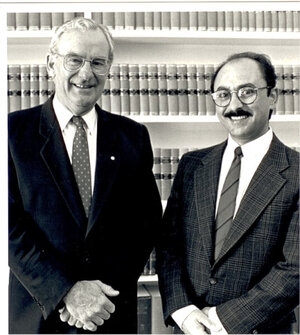 Under former PM Paul Keating, the minister for Foreign Affairs Gareth Evans, “criticized Israel’s human rights records during a visit to Israel in 1992 and echoed U.S. support for General Assembly Resolution 194, which calls for the repatriation of the Palestinian refugees forced out of their homeland in 1948”, as Kazak remembers it. In response, the President of ECAJ Leslie Caplan declared: “Unless the Government stepped back from the views expressed by Senator Evans, it would cost the ALP significant Jewish support at the next federal election.”
Under former PM Paul Keating, the minister for Foreign Affairs Gareth Evans, “criticized Israel’s human rights records during a visit to Israel in 1992 and echoed U.S. support for General Assembly Resolution 194, which calls for the repatriation of the Palestinian refugees forced out of their homeland in 1948”, as Kazak remembers it. In response, the President of ECAJ Leslie Caplan declared: “Unless the Government stepped back from the views expressed by Senator Evans, it would cost the ALP significant Jewish support at the next federal election.”
Why would the ALP take such ultimatums seriously?
Because according to the next ECAJ President Jeremy Jones (in 1992): “It is not so much the Jewish vote that matters – there are fewer than 100,000 Jews in Australia – but rather the vast financial resources of the community’s wealthier members” (emphasis added). Similarly, according to Malcolm Fraser – the PM who came to power subsequent to the CIA coup that toppled Whitlam: “Fear of criticism from the Jewish lobby in Australia has so far prevented Australian governments taking effective action” (to help resolve the Israel-Palestine conflict).
That such lobbies act on behalf of foreign states is evident by their own admissions. In 1985 when Leibler was President of the Zionist Federation of Australia (ZFA), he wrote, “directors interact fairly regularly with politicians, editors and journalists on a national scale and are in contact with officers of the Department of Foreign Affairs” and that his organisation “works in close cooperation with the Israel Embassy in Canberra”. In 1993 according to Mark Leibler, the “ZFA receives funds from the Jewish Agency in Israel”, in other words, the ZFA is very much an agent of ‘foreign interference’.
Kazak also cites Samuel Lipski, the former editor-in-chief of the Australian Jewish News and a journalist for a number of major Australian newspapers, who admits that “since the 1982 Lebanon War, the ECAJ [Executive Council of Australian Jewry] and the ZFA allowed, and the Likud government encouraged, a blurring of the roles between the ECAJ/ZFA and the Israeli Embassy” and as a result, “these two bodies became quasi-diplomatic agencies, often filling the vacuum created by an undermanned and remote Israel embassy”. This is remarkably similar to the fear-campaign about China, which is that ostensibly cultural bodies associated with them function as extensions of their embassy.
When Gough Whitlam was PM, Australia had a government that addressed the Israel-Palestine conflict in a way that reflected the actual composition of the Australian people, rather than the interests of ‘foreign powers’. Speaking in 1985 to an audience at the National Press Club in Canberra, ten years after the CIA backed palace ‘coup’ that removed him, Whitlam, at the launch of his book, was questioned by a journalist about the “blackmail” he faced during the 1973 Arab-Israeli war: (at 48:41) “you say that political pressure and even blackmail was brought to bear on you … what was the blackmail, how was it exercised and who was responsible for it?” Whitlam responded unequivocally with, “the blackmail was exercised by some heroes in the Australian Jewish community on the other side of the world from the hostilities that we should support Israel in the dispute…”. A former PM claimed he was ‘blackmailed’ by a community group in Australia that is almost certainly acting to influence Australian political affairs.
The Whitlam era represented Australia’s first attempt at addressing foreign conflicts, not through the eyes of Britain or the US, but through the eyes of an independent Australia, with the intention of pursuing a foreign policy that reflected the multiethnic citizenry of Australia.
In justifying why, he believed Australia should remain neutral and “take all steps available to Australia in resolving those disputes”, Whitlam pointed out that “people in Australia should realise that there are now as many Arabs as Jews in Australia” and that “there are as many Muslims as Jews, and we want everybody in Australia, of whatever racial origin, of whatever religious persuasion to live in harmony and fruitful cooperation in this country of their adoption or their birth”.
Today, at 333,051 people, there are 3-4 times as many Australians with ancestry from Arab nations, than Australians of Jewish religious affiliation[2], and only a miniscule minority of Australian Jews can claim continuous ancestry in historic Palestine. The rest claim ancestry from the ancient Jewish diaspora[3] that was expelled from Judea by the conquering Romans in 136 CE, after which they were forbidden from even entering Jerusalem, that is, until the Arab Muslim Caliphate defeated the (Byzantine) Romans in 635 CE, and allowed Jews the ‘right of return’, a right that today’s Israel denies the modern Arab Palestinian diaspora.
Conclusion
If these news laws are invoked at the whim of Federal ministers, then what gets investigated is ultimately at the discretion of the elected government. So long as the elected government remains acceptable to the United States and Israel, these laws will be blindly used against the enemies of the United States and Israel, with no consideration for Australia’s independent interest. Are these laws about protecting us from the damaging interference of foreign states in general, or will they be implemented to serve some foreign states in their attempts to undermine the otherwise mutually beneficial relations we have with other foreign states?
To economically compete on better terms with China, Australia must divert mining industry profits towards productive investment inside Australia, but that would require standing up to the United States, its capital owners in Australia, and the Murdoch media empire, which despite being owned by an Australian, does not advocate for economic loyalty to Australia. At least the United States can claim to have invested in Australia, whereas Israel is a country that does negligible trade with Australia, and appears only interested in making new enemies for Australia, and like the United States, advocate for endless wars.
References
[1] Minerals (58%), precious metals (7%), metals (6%), animal products (6%), vegetables (4%), foodstuffs (3%), and wood (1%).
[2] According to the ABS 2016 Census. Those who listed Arab nations (or simply Arab with no further definition) by first ancestry: 333,051 (of which Levantine is 210,908). Jewish by religion: 91,023.
[3] Even the religious/caste community to which I belong claims ancient Jewish ancestry so claiming Palestine on that basis is absurd since it would grant literally hundreds of millions of people across Asia the ‘right of return’ to historic Palestine.

